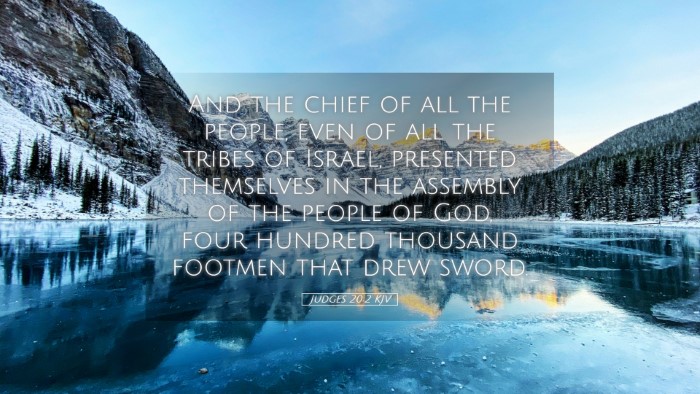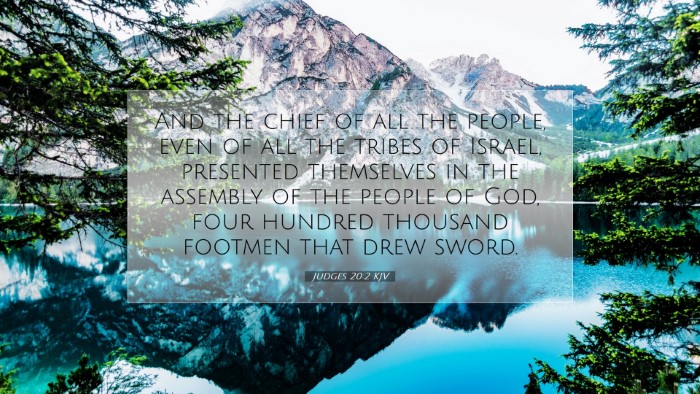Bible Commentary on Judges 20:2
Verse: Judges 20:2 - "And the chief of all the people, even of all the tribes of Israel, presented themselves in the assembly of the people of God, four hundred thousand footmen that drew sword."
Introduction
This passage describes a significant moment in the history of Israel, illustrating the collective response of the tribes to a grievous moral crisis—the heinous crime committed in Gibeah. The narrative presents a gathering where the people collectively sought justice, showcasing the themes of unity, justice, and divine judgment. Commentaries by Matthew Henry, Adam Clarke, and Albert Barnes offer deep insights into the implications of this verse for understanding Israel’s judicial proceedings and moral imperatives.
Contextual Analysis
The context surrounding Judges 20 highlights the disturbances in Israel's moral and social fabric. The specific events that led to this assembly necessitated a strong and unified response. The previous chapters recount the brutal assault and murder of a Levite's concubine, which incited outrage among the tribes of Israel.
Gathering of Tribes
Matthew Henry emphasizes the significance of the assembly, noting that it reflects a collective moral consciousness among the Israelites. The gathering of "all the tribes of Israel" signifies a rare moment of national unity and resolve amid a time of chaos. The unity is further symbolized by the presence of "four hundred thousand footmen that drew sword," indicating not just mere numbers, but the willingness of the entire nation to engage in conflict for justice.
The Nature of the Assembly
Albert Barnes elaborates on the nature of this assembly as a legal and moral response to sin. He notes that the tribes came together in a solemn congregation, recognizing their collective responsibility to address the crime. The existence of such a sizable force indicates that this was more than a mere discussion; it was a mobilization for action, highlighting the seriousness of the offense and the commitment to rectifying it.
Symbolism in Numbers
Adam Clarke provides a theological interpretation of the numerical detail presented in this verse. The number “four hundred thousand” can be seen as symbolizing completeness in Israel's efforts to pursue justice. Clarke interprets the readiness for combat as indicative of Israel's internalization of their covenantal duties, showing that they took seriously their responsibilities toward each other and the holiness of the land.
Moral Responsibility
Matthew Henry highlights that the assembly reflects a call to moral responsibility that resonates beyond the historical context. Each tribe's participation implies a shared obligation in upholding God’s law. The readiness of the Israelites to combat sin demonstrates their acknowledgment of collective guilt and the necessity for communal justice—an important lesson for the church today regarding how to respond to sin and injustice within its midst.
Implications for Leadership
In analyzing the leadership context, Albert Barnes points out that the leaders of the tribes played a crucial role in this mobilization. Their ability to gather such a formidable force indicates strong leadership and a clear vision of justice. This aspect suggests that pastors and leaders today must also rally their communities in times of moral crisis, urging collective action in alignment with biblical principles.
Application for Today
The themes present in Judges 20:2 find relevance today as spiritual leaders face moral crises within their congregations and societies. The emphasis on unity, communal responsibility, and the pursuit of justice resonates profoundly. This passage teaches contemporary believers about the importance of coming together as a body of Christ to confront and rectify sin, embodying the spirit of unity that is essential for maintaining holiness in the church.
Conclusion
Judges 20:2 serves as a powerful reminder of the need for unity and collective action in the face of moral failure. As the tribes of Israel rallied together, so too should modern Christians respond to the call for justice and accountability within their communities. The insights provided by Matthew Henry, Adam Clarke, and Albert Barnes not only enhance our understanding of this passage but also serve as guiding principles for contemporary Christian life.


